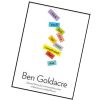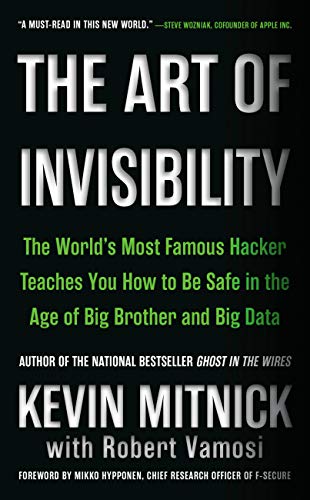7 Best-Selling Network Security Books Millions Love
Discover Network Security Books endorsed by Ben Goldacre, Steve Wozniak, and Laurence Tribe — expert picks with lasting impact






There's something special about books that both critics and crowds love, especially in a field as vital as network security. Millions of readers have turned to these best-selling works because they combine practical strategies with trusted expertise, helping protect data and systems in an ever-evolving digital landscape. Network security isn't just technical jargon; it's a frontline defense shaping our connected world.
Experts like Ben Goldacre, a doctor and academic at Oxford, have highlighted The Art of Invisibility for its real-world lessons on privacy and social engineering. Steve Wozniak, cofounder of Apple, praises the same book for educating everyday users about digital privacy risks. Meanwhile, constitutional law scholar Laurence Tribe draws attention to Sandworm for its unflinching look at state-sponsored cyberwarfare, a topic few books cover with such depth.
While these popular books provide proven frameworks and insights, readers seeking content tailored to their unique network security challenges might consider creating a personalized Network Security book that combines these validated approaches with your individual goals and background.
Recommended by Ben Goldacre
Doctor and academic at Oxford CEBM
“Oh wow Twitter say this huge hack was done through a coordinated social engineering attack. Hugely recommend Kevin Mitnick's book on this: The Art of Deception. Also a great example of (openly disclosed) ghost writing making a technical topic very readable” (from X)
by Kevin Mitnick··You?
Unlike most network security books that focus narrowly on technical defenses, Kevin Mitnick draws on his notorious hacking past to reveal how everyday people can protect their privacy in an age dominated by surveillance and data mining. You’ll learn how to shield your online activity with concrete tactics ranging from password management to anonymizing your Wi-Fi usage, illustrated through true stories of major exploits and social engineering hacks. This book suits anyone concerned about digital privacy, whether you’re a casual internet user or a security professional seeking practical insights beyond jargon. Mitnick’s chapters on wireless security and identity theft prevention offer specific tools to reclaim control over your data footprint.
by Andrew Lockhart·You?
by Andrew Lockhart·You?
The methods Andrew Lockhart developed while working as a network administrator clearly shape this book’s practical approach to security. Instead of theoretical discussions, you get 100 concise, targeted hacks designed to strengthen your Linux, UNIX, or Windows systems right now. For instance, the book offers clever techniques for intrusion detection, encryption, and laying traps for malicious actors, all explained with simple examples. If you manage networks and want straightforward, immediately applicable strategies to protect your infrastructure, this book speaks directly to your daily challenges and time constraints.
by TailoredRead AI·
by TailoredRead AI·
This tailored book explores effective network defense techniques designed around your specific background and goals. It covers fundamental concepts of network security while diving into proven tactics for protecting systems against attacks. By focusing on your interests, the book reveals practical approaches to recognizing threats, hardening defenses, and responding to incidents with confidence. It combines widely validated knowledge with personalized insights, making complex security topics accessible and relevant to your unique needs. This personalized guide invites you to deepen your understanding and develop skills that directly address your security challenges, creating a focused learning experience that aligns precisely with your objectives.
Recommended by Laurence Tribe
Constitutional law scholar and Harvard professor
“Vote augmentation looks like the newest form of election manipulation. It was a favorite Putin/GRU technique in Estonia, Georgia, and Ukraine. See Andy Greenberg’s book “Sandworm.”” (from X)
by Andy Greenberg··You?
When Andy Greenberg, a Wired senior writer with deep roots in security and hacker culture, penned this book, he aimed to expose the shadowy cyberwarfare landscape shaped by Russia's elite hacking group, Sandworm. You’ll learn how these hackers orchestrated the infamous NotPetya attack, disrupting infrastructure from hospitals to postal systems, and the intricate ties between digital assaults and geopolitical strategy. Greenberg’s detailed narrative brings clarity to the blurred lines between cyber and physical warfare, especially through the lens of cases like the 2017 Ukrainian cyberattacks. If you’re keen on understanding the real-world implications of cyber threats on national security, this book offers a sharp, investigative perspective.
Recommended by BookAuthority
“One of the best Cyber Security books of all time”
by Alan J White, Ben Clark··You?
by Alan J White, Ben Clark··You?
Drawing from his extensive cybersecurity experience, Alan J White co-authored this manual to equip you with precise tactics during cyber incidents. The book lays out clear steps aligned with the NIST Cybersecurity Framework, covering Identify, Protect, Detect, Respond, and Recover phases, with practical commands and procedures designed for rapid deployment in high-pressure situations. For anyone involved in cyber defense, especially those on blue teams, it offers a distilled, no-frills approach to incident response that cuts through theory to focus on actionable fieldwork. Chapters like the detailed response protocols and recovery checklists will sharpen your readiness and operational confidence.
by Elizabeth D. Zwicky, Simon Cooper, D. Brent Chapman·You?
by Elizabeth D. Zwicky, Simon Cooper, D. Brent Chapman·You?
Elizabeth D. Zwicky, Simon Cooper, and D. Brent Chapman bring extensive experience in network security to this detailed guide on firewalls, written amid the rapid expansion of Internet commerce and its accompanying risks. You'll gain a deep understanding of various firewall technologies, including packet filtering and proxying, alongside practical approaches to configuring Internet services like email, web scripting, and remote access to operate securely behind firewalls. The book is particularly valuable for IT professionals and network administrators who need to build resilient defenses against threats like denial of service attacks and password exploits, with chapters dedicated to real-world protocols like DNS, Kerberos, and SMB. If you’re looking to strengthen your network’s security infrastructure with a thorough, technical reference, this book offers a solid foundation without unnecessary hype.
by TailoredRead AI·
This tailored book explores an intensive 30-day plan designed to rapidly elevate your network security capabilities. It covers core principles of securing networks, identifying vulnerabilities, and deploying effective defenses, all matched to your background and specific goals. By focusing on the most relevant topics for your experience level and interests, it offers a clear path to enhance your skills without sifting through unrelated material. Through a personalized approach, it examines essential tools and techniques to detect threats, strengthen system protections, and respond to incidents efficiently. This focused exploration ensures you gain practical knowledge and confidence to defend networks effectively, making your learning both engaging and directly applicable to your needs.
by Fred Kaplan·You?
by Fred Kaplan·You?
Fred Kaplan, a Pulitzer Prize-winning journalist and Slate columnist, turned his investigative eye to the shadowy world of cyber warfare, revealing a complex history few outside intelligence circles have seen. You learn about the evolution of cyber conflict from the Gulf War to recent global hotspots, gaining insights into the roles of the NSA, Pentagon cyber units, and national security policymakers. Kaplan unpacks specific episodes, like the cyber operations in Serbia and Iran, exposing how these secretive battles shape modern warfare. This book suits those curious about the intersection of technology, military strategy, and geopolitics, offering a detailed narrative rather than technical how-to guides.
by Jon Erickson··You?
by Jon Erickson··You?
Drawing from a deep personal history of hacking that began in childhood, Jon Erickson offers an immersive dive into the mechanics behind cybersecurity exploits rather than just their use. You'll gain concrete skills in C programming, assembly, and shell scripting, all framed through the lens of offensive security techniques. Chapters on buffer overflows and debugger usage reveal how system memory can be manipulated, while networking sections explain hijacking TCP connections and evading detection. This book suits those with a technical curiosity eager to understand hacking from the ground up, though beginners without programming patience might find it challenging.
Proven Network Security Methods, Personalized ✨
Access expert-backed strategies tailored to your specific Network Security challenges and goals.
Trusted by thousands of cybersecurity professionals worldwide
Conclusion
These seven titles offer diverse yet complementary perspectives on network security — from hands-on defense tactics and firewall design to the geopolitical realities of cyberwarfare. If you prefer proven methods grounded in real-world experience, Blue Team Field Manual and Network Security Hacks provide immediate, actionable guidance. For those interested in understanding broader contexts, Sandworm and Dark Territory illuminate the strategic forces shaping cyber conflict.
For privacy-focused readers, The Art of Invisibility delivers essential knowledge to safeguard your digital footprint. Meanwhile, Hacking offers deep technical insight for those ready to master exploit development, and Building Internet Firewalls remains a foundational resource for securing network perimeters.
Alternatively, you can create a personalized Network Security book to blend these proven approaches with your unique priorities. These widely-adopted strategies have helped many succeed in defending their networks and advancing their cybersecurity expertise.
Frequently Asked Questions
I'm overwhelmed by choice – which book should I start with?
Start with The Art of Invisibility if privacy is your priority, or Blue Team Field Manual for practical defense tactics. These books balance accessibility and impact, helping you build solid foundations before tackling more technical or strategic reads.
Are these books too advanced for someone new to Network Security?
Not at all. While books like Hacking delve into technical depths, others such as Network Security Hacks offer straightforward tips. Beginners can find approachable entry points depending on their interest and background.
What's the best order to read these books?
Consider starting with privacy and practical defense books like The Art of Invisibility and Blue Team Field Manual. Then explore strategic perspectives in Sandworm and Dark Territory, followed by technical deep-dives like Hacking and Building Internet Firewalls.
Should I start with the newest book or a classic?
Both offer value. Newer books like Sandworm address current cyberwarfare trends, while classics such as Building Internet Firewalls provide timeless technical expertise. Combining both gives a well-rounded understanding.
Do I really need to read all of these, or can I just pick one?
You can absolutely pick based on your goals. Each book targets different facets of network security—from practical hacks to geopolitical insights—so choose what aligns best with your needs and interests.
Can I get a Network Security book tailored to my specific needs?
Yes! While these expert books cover proven strategies, a personalized Network Security book can blend these insights with your unique background and goals. Check out creating your custom Network Security book for a focused learning experience.
📚 Love this book list?
Help fellow book lovers discover great books, share this curated list with others!
Related Articles You May Like
Explore more curated book recommendations






